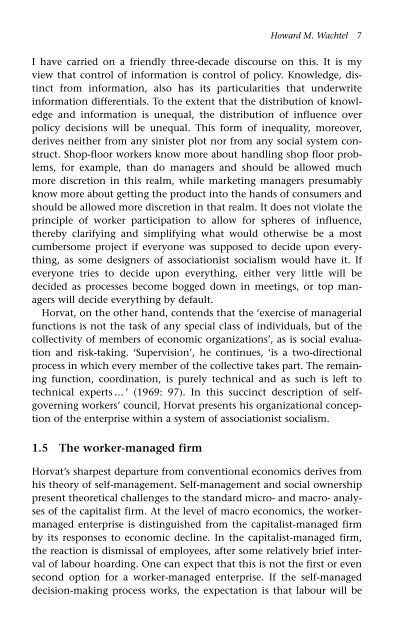Equality, Participation, Transition: Essays in Honour of Branko Horvat
Equality, Participation, Transition: Essays in Honour of Branko Horvat
Equality, Participation, Transition: Essays in Honour of Branko Horvat
You also want an ePaper? Increase the reach of your titles
YUMPU automatically turns print PDFs into web optimized ePapers that Google loves.
I have carried on a friendly three-decade discourse on this. It is my<br />
view that control <strong>of</strong> <strong>in</strong>formation is control <strong>of</strong> policy. Knowledge, dist<strong>in</strong>ct<br />
from <strong>in</strong>formation, also has its particularities that underwrite<br />
<strong>in</strong>formation differentials. To the extent that the distribution <strong>of</strong> knowledge<br />
and <strong>in</strong>formation is unequal, the distribution <strong>of</strong> <strong>in</strong>fluence over<br />
policy decisions will be unequal. This form <strong>of</strong> <strong>in</strong>equality, moreover,<br />
derives neither from any s<strong>in</strong>ister plot nor from any social system construct.<br />
Shop-floor workers know more about handl<strong>in</strong>g shop floor problems,<br />
for example, than do managers and should be allowed much<br />
more discretion <strong>in</strong> this realm, while market<strong>in</strong>g managers presumably<br />
know more about gett<strong>in</strong>g the product <strong>in</strong>to the hands <strong>of</strong> consumers and<br />
should be allowed more discretion <strong>in</strong> that realm. It does not violate the<br />
pr<strong>in</strong>ciple <strong>of</strong> worker participation to allow for spheres <strong>of</strong> <strong>in</strong>fluence,<br />
thereby clarify<strong>in</strong>g and simplify<strong>in</strong>g what would otherwise be a most<br />
cumbersome project if everyone was supposed to decide upon everyth<strong>in</strong>g,<br />
as some designers <strong>of</strong> associationist socialism would have it. If<br />
everyone tries to decide upon everyth<strong>in</strong>g, either very little will be<br />
decided as processes become bogged down <strong>in</strong> meet<strong>in</strong>gs, or top managers<br />
will decide everyth<strong>in</strong>g by default.<br />
<strong>Horvat</strong>, on the other hand, contends that the ‘exercise <strong>of</strong> managerial<br />
functions is not the task <strong>of</strong> any special class <strong>of</strong> <strong>in</strong>dividuals, but <strong>of</strong> the<br />
collectivity <strong>of</strong> members <strong>of</strong> economic organizations’, as is social evaluation<br />
and risk-tak<strong>in</strong>g. ‘Supervision’, he cont<strong>in</strong>ues, ‘is a two-directional<br />
process <strong>in</strong> which every member <strong>of</strong> the collective takes part. The rema<strong>in</strong><strong>in</strong>g<br />
function, coord<strong>in</strong>ation, is purely technical and as such is left to<br />
technical experts … ’ (1969: 97). In this succ<strong>in</strong>ct description <strong>of</strong> selfgovern<strong>in</strong>g<br />
workers’ council, <strong>Horvat</strong> presents his organizational conception<br />
<strong>of</strong> the enterprise with<strong>in</strong> a system <strong>of</strong> associationist socialism.<br />
1.5 The worker-managed firm<br />
Howard M. Wachtel 7<br />
<strong>Horvat</strong>’s sharpest departure from conventional economics derives from<br />
his theory <strong>of</strong> self-management. Self-management and social ownership<br />
present theoretical challenges to the standard micro- and macro- analyses<br />
<strong>of</strong> the capitalist firm. At the level <strong>of</strong> macro economics, the workermanaged<br />
enterprise is dist<strong>in</strong>guished from the capitalist-managed firm<br />
by its responses to economic decl<strong>in</strong>e. In the capitalist-managed firm,<br />
the reaction is dismissal <strong>of</strong> employees, after some relatively brief <strong>in</strong>terval<br />
<strong>of</strong> labour hoard<strong>in</strong>g. One can expect that this is not the first or even<br />
second option for a worker-managed enterprise. If the self-managed<br />
decision-mak<strong>in</strong>g process works, the expectation is that labour will be

















